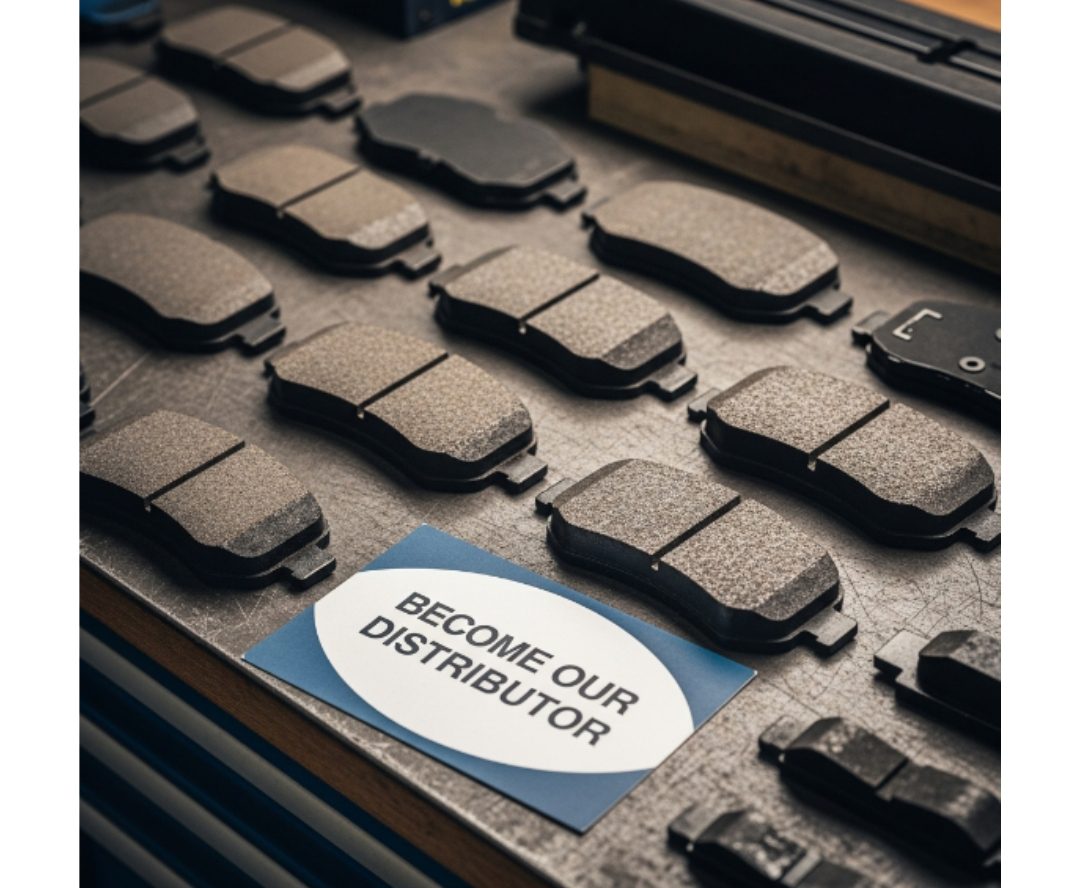Choosing the correct brake pads is a crucial decision that directly affects safety, performance, and long-term vehicle dependability in the fast-paced world of automotive maintenance. When selecting brake pads, drivers—from casual commuters to professional fleet operators—consider a wide range of factors, including strong durability against wear, excellent heat resistance to prevent fade, superior braking performance, minimal noise and dust generation, eco-friendly compliance with international regulations, flawless manufacturing quality, and precise vehicle-specific fitment.
Using scientific details, industry norms, and practical benefits, this in-depth analysis explores how Jinli brake pads compare to well-known substitutes and shows why Jinli continuously surpasses the competition. Jinli is the industry standard for contemporary brake solutions, emphasising innovation and dependability.
Friction Coefficient and Braking Performance: Strength That Encourages Self-Belief
The friction coefficient, which measures how well a brake pad grips the rotor to transform kinetic energy into heat and stop your car, is the key to any brake pad’s efficiency. With a friction coefficient of 0.40, Jinli’s copper-free pure ceramic brake pads established a new benchmark, greatly exceeding the industry standard of 0.30 to 0.35. This improved performance isn’t just a figure on a specification sheet; it shows up as real advantages at crucial times.
Consider negotiating a rain-soaked interstate at highway speeds or a busy urban roadway at rush hour, where abrupt merges necessitate split-second stops. Jinli’s high-friction formula guarantees shorter stopping distances and more responsive pedal feel, lowering the margin for mistake.
On the other hand, although being reasonably priced, many aftermarket pads frequently fail when put under stress. While some organic pads value smoothness above pure force, semi-metallic versions may provide initial bite but deteriorate rapidly under damp conditions. Because of its sophisticated ceramic composition, which maintains ideal friction across a wide temperature range, Jinli delivers consistently.
This advantage is confirmed by independent testing using SAE J2522 methods, demonstrating Jinli’s capacity to maintain a steady braking force even after numerous applications. This results in improved control for drivers of high-performance cars, such as BMW M-series or Honda Type R models, where every millisecond matters while vigourous driving.
 Levels of Noise and Dust: The Clean, Silent Revolution
Levels of Noise and Dust: The Clean, Silent Revolution
After a short drive, few things are more annoying than the screech of noisy brakes or the ugly alloy wheels covered in black dust. In addition to being annoying, these problems may indicate underlying inefficiencies that degrade the driving experience. With its copper-free ceramic formulations, which are intended for whisper-quiet operation and nearly dust-free performance, Jinli takes them head-on
. By avoiding harsh metallic fibres, Jinli reduces screaming vibrations and closely complies with SAE J2521 AA–AAA noise requirements, which are the benchmark for superior acoustics. For owners of premium cars who value appearance as much as utility, users remark that the wheels remain immaculate even after thousands of miles.
Here, rivals frequently fail. Although some brands use chamfered edges to reduce dust, Jinli’s all-encompassing strategy is superior. For example, the lack of brake dust results in fewer wheel cleanings and fewer allergens in the cabin during routine situations like school runs or supermarket hauls. This low-maintenance attraction also applies to city inhabitants, who must frequently apply light braking while parking in confined spaces. Jinli makes sure that this is done quietly and neatly, maintaining both comfort and kerb appeal.
Fade Stability and Heat Resistance: Relentless Performance Under Stress
For anyone pushing their car in challenging conditions, brake fade—the alarming loss of stopping ability due to overheating—is a nightmare. Pads can be pushed to their limits by relentless stop-and-go traffic in congested cities, tough track days, or fast descents in the Rockies. Jinli combats this by using exclusive heat-resistant ceramics that maintain a constant friction coefficient well above normal limits, up to 650°C. Even after extended heat cycles, this thermal resilience ensures steady pedal modulation by preventing the glazing or softening that befalls inferior pads.
Based on extensive dynamometer testing on the LINK 3900 unit, Jinli’s pads show very little fade—even after more than 200 simulated emergency stops, stopping distances stay consistent. This means longer component life and fewer safety hazards for fleet managers driving delivery vans or off-road enthusiasts in Jeeps.
However, around 400°C, many organic or low-end semi-metallic pads start to fade, requiring drivers to press the pedal, a risky practice that undermines confidence. Jinli’s engineering transforms possible risks into non-events by elevating braking from reactive to proactive.
Structural Integrity and Durability: Engineered for Safety, Built to Last
A straightforward drive might become disastrous due to premature wear or catastrophic failures like delamination. Innovative strengthened backing plates and a patented underlayer that binds the friction material to the steel substrate and increases shear strength by up to 30% are two ways Jinli protects against these. In addition to preventing breaking under tension, this design encourages uniform wear patterns, doubling the pad life to 50,000–70,000 miles under moderate use compared to typical generics.
Quality assurance is crucial. Automated systems test each batch for density and shear, guaranteeing accuracy to within 1 gramme of mix. The outcome? a fault rate of less than 0.1%, giving owners and mechanics alike confidence. Imagine a long-haul truck driver travelling interstate miles; Jinli’s pads reduce downtime by absorbing loads and vibrations. Jinli’s structural strength protects not only longevity but lives against weaker substitutes that are prone to warping.
Adherence to Regulations and the Environment: Green Braking for a Sustainable Future
Brake pads must advance from performance to planetary stewardship as international restrictions tighten—consider California’s copper bans or Euro 7’s particle emission limits. Jinli sets the norm with completely copper-free ceramics that reduce heavy metal runoff by 90% while adhering to IATF 16949:2016, FMVSS 135, ECE R90, and NSF guidelines. These pads, which are asbestos-free by design, lessen microplastic pollution in streams, making them appealing to both regulators and environmentally conscious consumers.
In forward-thinking markets, traditional metallic pads that are loaded with copper and other impurities fall behind and run the risk of fines or obsolescence. Jinli’s innovative strategy encourages the use of electric vehicles (EVs), as regenerative braking necessitates pads that can manage residual thermal loads without endangering the environment. Jinli is a must for corporate fleets aiming to meet ESG targets.
Innovation and Excellence in Manufacturing: Accuracy from Raw Materials to Final Product
Jinli’s control over the whole production chain is what makes it unique. The company, which was established in Weifang, Shandong, in 2012, self-produces essential inputs like titanium salts, reducing prices and unpredictability while maintaining purity. Among the more than 1,000 machines in their facilities are automated mixing lines and two LINK 3900 dynamometers for round-the-clock certification. Pads with uniform density and hardness that meet OEM specifications are produced using a special two-step cold-pressing technique that locks in uniformity.
Eight different formula systems, ranging from high-carbon ceramics to NAO non-asbestos organics, are produced via this vertical integration and are suited for a variety of applications. A transparency uncommon in the industry is fostered by barcode-tracked workflows and 7S lean principles, which guarantee that zero defects escape. At its core, Jinli is an innovator, and its in-house R&D lab iterates quickly, surpassing competitors who depend on external components.
Global Production Capacity and Reach: Expanding Quality Globally
Jinli’s quality is matched by its ambition: The majority of the U.S. RV market is accounted for by two large facilities, one at 137,000 m² and the other at 65,000 m², which produce 20 million sets a year. In order to avoid tariffs and speed up distribution throughout Asia-Pacific, a new plant in Cambodia will add 6 million sets. Since 2022, Jinli has supplied more over 2,000 part numbers for passenger and commercial vehicles worldwide, with exports accounting for 51–70% of output.
Four manufacturing lines maintain IATF-certified rigour, allowing for quick adaptability to demand spikes, such as EV surges, without sacrificing quality. It is a dependable pipeline for global distributors and guarantees fresh, flawless supplies for end consumers.
Adaptability and Vehicle-Specific Fit: Accuracy for Each Trip
Risks associated with generic pads include misaligned shims that produce noise or incorrect chamfers that result in uneven wear. Using more than 2,000 moulds to ensure an OEM-like fit, Jinli counters create custom designs for brands like BMW, Honda, Chevrolet, BYD, Great Wall, and Hongqi. Sporty sedans are suited for high-μ ceramics, while luxury SUVs are pampered by dust-free varieties.
Jinli’s catalogue guarantees plug-and-play installation for everything from heavy-duty pickups to small EVs, reducing labour costs and increasing safety. Compared to universal kits, which frequently call for shimming hacks, this specialisation performs better.
OEM/ODM Capabilities and Customisation: Tailored Solutions for Future Requirements
Jinli’s skill is seen in collaborations: Formula adjustments, private labelling, packaging, and more than thirty new moulds per month are all included in full OEM/ODM services. Their lab produces prototypes in a matter of weeks, whether they are mixing carbon-ceramic for hypercars or low-metal for fleet economy.
From metallic-free for emissions-sensitive areas to bespoke NAO for silent hybrids, this agility enables businesses to innovate without overhead.
Comparative Analysis: Jinli in Relation to Other Prominent Brands
PowerStop, Brembo, and Akebono are well-known brands that maintain their position. Brembo emphasises fade-resistant power for track use, albeit at a higher cost, while Akebono specialises in low-dust ceramics with linear feel and lifespan up to 100,000 miles in specific applications. Strong bite and heat tolerance make PowerStop’s Z23 and Z36 mixes perfect for daily drivers looking for value. Once ingested, customers report better modulation.
However, Jinli combines both advantages: Brembo’s stability and Akebono’s silence, enhanced by PowerStop’s affordability—but with better environmental compliance and structural reinforcements that rivals lack. Although there aren’t any direct head-to-heads, Jinli’s vertical control and SAE-validated metrics point to greater versatility at competitive pricing.
Real-World Applications and Considerations: From Demanding Duties to Daily Drives
Everyday commuters enjoy Jinli’s flawless combination: fade-free comfort in traffic, dust-free wheels for weekend washes, and silent stops for family errands. The high friction is used by enthusiasts in Hongqi flagships or modified Chevrolets to carve canyons. Fleets, ranging from Great Wall hauliers to BYD taxis, take use of low tariffs purchased from Cambodia and bulk durability to save money without sacrificing quality. EV eco-drivers value the synergy between regen systems and low emissions.
Through longer intervals, Jinli reduces lifetime expenditures by 20% in simulations, which is advantageous for owners on a tight budget.
Conclusion: Jinli—The Ultimate Innovation in Braking
Jinli brake pads surpass conventional fare by combining performance, safety, durability, compliance, and craftsmanship. A comprehensive superior is created by their 0.40+ friction, silent efficiency, thermal fortitude, reinforced constructions, green credentials, and expert production. Whether it’s for fleets, EVs, sedans, or commuters, Jinli adapts, performs, and lasts.
Jinli is essentially the epitome of automotive evolution: inventive, flawless, and infinitely accountable. Select Jinli to brake with unmatched comfort.


































